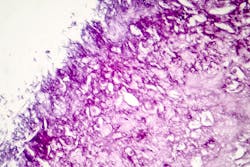Outcomes for melanoma patients have vastly improved thanks to new treatment options. However, those with high-risk disease who have their tumors surgically removed still have a substantial chance of relapse. A team of researchers from institutions across the United States, including Moffitt Cancer Center, launched a phase 2 clinical trial evaluating a new treatment option for this patient population.
Their results, published in The New England Journal of Medicine, show that treating resectable stage 3 and 4 melanoma patients with the immunotherapy drug pembrolizumab both before and after surgery greatly improves outcomes when compared to pembrolizumab given only after surgery.
This trial included 313 patients with resectable stage 3 or 4 melanoma from 90 institutions across the U.S. All patients had tumors that were still present and measurable by CT scans. In other words, they could not have already had all their cancer removed prior to the start of the trial. Patients were randomized into two groups. The first group received pembrolizumab as both neoadjuvant (three doses before surgery) and adjuvant (15 doses after surgery) therapy, while the second group received all 18 doses of pembrolizumab after surgery. With a median follow-up of 14.7 months, the 154 patients in the neoadjuvant-adjuvant group had a significantly longer event-free survival than the 159 patients in the adjuvant only group. The two-year event-free survival rates were 72% in the neoadjuvant-adjuvant group versus 49% in the adjuvant only group. The treatment benefit was observed in all patient subgroups that were analyzed, including groups based on age, sex, performance status and stage of disease. Of particular note, there were fewer postsurgical recurrences in the patients in the neoadjuvant plus adjuvant group.
One concern with neoadjuvant therapy is the potential risk of tumor growth or developing toxicities that would prevent patients from undergoing surgery. In the neoadjuvant-adjuvant group, less than 10% of patients developed progressive disease or toxicities from pembrolizumab neoadjuvant therapy that prevented them from undergoing surgical removal of the tumor. Overall, the rates and types of adverse events were similar between the two treatment groups. The percentage of patients who developed grade 3 or 4 treatment-related adverse events during adjuvant therapy was 12% in the neoadjuvant-adjuvant group and 14% in the adjuvant only group.

